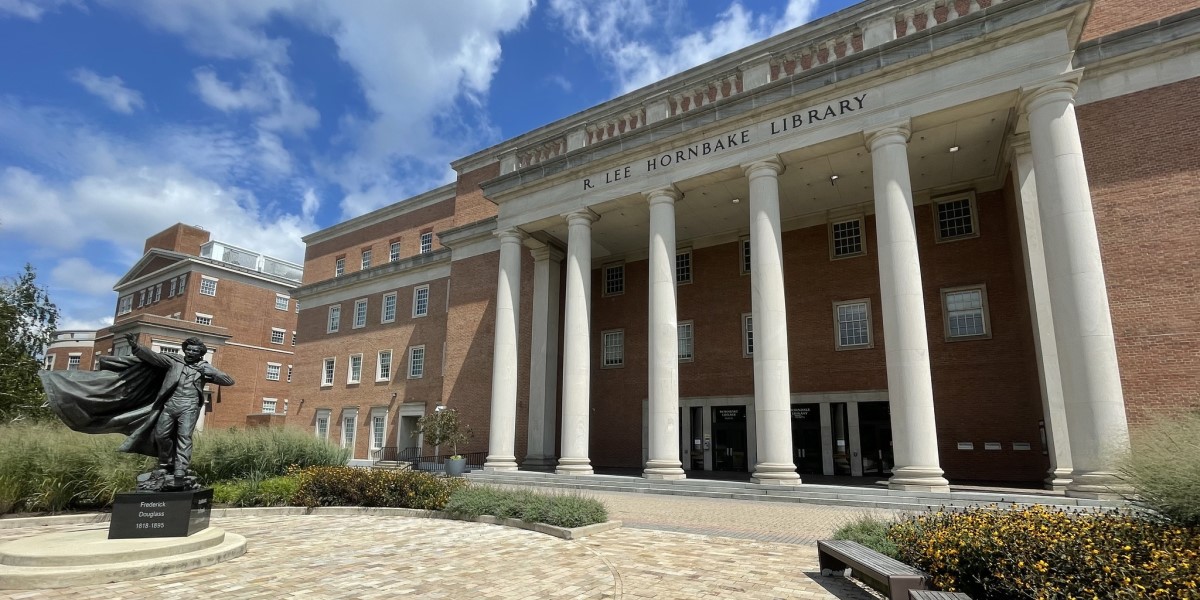UMD INFO College Faculty Awarded for Research Excellence
14 INFO faculty members are to be honored at the 2024 UMD Research Excellence Celebration

Photo of Hornbake Plaza on the UMD College Park Campus, home to the INFO College
Demonstrated Societal Impact
Eun Kyoung Choe
Dr. Choe has developed the “Data@Hand” app that empowers you to understand your data in ways you never thought possible. By combining the power of speech and touch, it provides a versatile, user-friendly platform for delving into your health data.
Katrina Fenlon
Dr. Fenlon’s National Science Foundation (NSF) project “Building a Sustainable Future for Anthropology’s Archives” aims to uncover how to make unpublished archival materials—which are often not digitized and difficult to find online—more accessible to researchers and communities through web search.
Zubin Jelveh
Dr. Jelveh is developing record linkage algorithms that are tailored for the unique features of criminal justice data and has contributed to the development of the Maryland Volunteer Lawyers Service’s Client Legal Utility Engine (CLUE) tool to impact state reform efforts.
Diana Marsh
Dr. Marsh’s National Science Foundation (NSF) project “Building a Sustainable Future for Anthropology’s Archives” aims to uncover how to make unpublished archival materials—which are often not digitized and difficult to find online—more accessible to researchers and communities through web search.
Sergii Skakun
Dr. Skakun has co-developed a system that has mapped about 2.5 million artillery strike craters in a 500-mile arc stretching across Ukraine’s heavily agricultural south and east—data that government and nongovernmental demining organizations can use to prioritize the most dangerous areas for cleanup
Mega Subramaniam
Dr. Subramaniam’s research focuses on enhancing the role of libraries in fostering the mastery of emerging digital literacies that are essential to STEM learning among underserved young people. She is currently working on a new digital literacy resource is advancing throughout the state intending to close the digital divide experienced by the thousands of Maryland residents who lack access to the internet, a digital device, or the skills to utilize either. Her research has been generously funded by various federal and private agencies, and brings research and practice together to enhance the skills of librarians and change lives and life opportunities.
Featured in a Renowned Scholarly Journal or Publication
Cody Buntain
Dr. Buntain is co-author of the renowned report “Enemy of My Enemy,” presenting research detailing Russian efforts to influence Canadians’ perceptions of the war in Ukraine over the last two years.
Susannah Paletz
In a recently published article in Science Advances, Dr. Paletz and other University of Maryland (UMD) researchers have found that when individual emotions such as anger, contempt, love, admiration, cute/kama muta (an emotion described as ‘being moved’ or ‘heart-warming’) wonder, pride, sadness, and amusement are expressed in a post, there is a significant impact on whether it gets shared or not.
Received Significant External Funding
Wei Ai
Dr. Ai is co-PI in a $1.5 million NSF award to measure the quality of large quantities of open-source mathematics lesson plans using an integration of cutting-edge machine learning techniques, knowledge of effective mathematics education and human feedback.
Vanessa Frias-Martinez
Dr. Frias-Martinez’s research focuses on the use of large-scale ubiquitous data to model the interplay between human mobility patterns and the built environment. She is also interested in how such models can be used to aid decision makers in areas such as poverty, natural disasters or smart cities. Her work has been funded by NSF’s Convergence Accelerator, Smart Cities , and Career programs.
Jennifer Golbeck
Dr. Golbeck is co-PI for the Minerva project “Semantic Foundations and Formal Methods for Evolutionary System-of-System (SoS) Architectures.” The broad topic area of the project is “Management and information in the defense environment.” This project will explore the benefits of semantic foundations and formal methods for synthesizing and formally analyzing evolutionary SoS decision models.
J. Bern Jordan
Dr. Jordan is PI of a five-year, $4.6 million Rehabilitation Engineering Research Center (RERC) grant from the National Institute on Disability, Independent Living, and Rehabilitation Research (NIDILRR) to create solutions that meet the needs of people living with diverse disabilities, ultimately fostering greater inclusion across all spheres of life.
Hernisa Kacorri
Dr. Kacorri is co- PI of a five-year, $4.6 million Rehabilitation Engineering Research Center (RERC) grant from the National Institute on Disability, Independent Living, and Rehabilitation Research (NIDILRR) to create solutions that meet the needs of people living with diverse disabilities, ultimately fostering greater inclusion across all spheres of life.
Amanda Lazar
Dr. Lazar is co-PI of a five-year, $4.6 million Rehabilitation Engineering Research Center (RERC) grant from the National Institute on Disability, Independent Living, and Rehabilitation Research (NIDILRR) to create solutions that meet the needs of people living with diverse disabilities, ultimately fostering greater inclusion across all spheres of life.
- Faculty & Staff
- INFO News
- Research News
- Accessibility and Inclusive Design
- Archival Science
- Data Science, Analytics, and Visualization
- Human-Computer Interaction
- Information Justice, Human Rights, and Technology Ethics
- Library and Information Science
- Machine Learning, AI, Computational Linguistics, and Information Retrieval
- Smart Cities and Connected Communities
- Social Networks, Online Communities, and Social Media
- Youth Experience, Learning, and Digital Practices